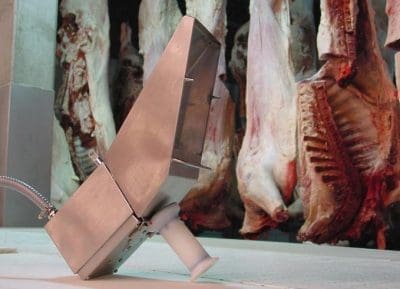TEYS Australia will showcase its progress towards objective carcase measurement during Beef 2018 in Rockhampton this week, with a series of short presentations and interactive displays of latest technology.
 Australia’s second largest beef processor in February set an objective to adopt objective MSA grading in some of its operations some time this year.
Australia’s second largest beef processor in February set an objective to adopt objective MSA grading in some of its operations some time this year.
Teys is also assessing DEXA yield assessment technology under a major industry-backed trial at its Lakes Creek plant near Rockhampton in Central Queensland, and will have video footage of the system in action on display at Beef 2018 this week.
Staff will be on hand to explain the DEXA technology, how it assesses carcase yield, and how it might fit within a modern beef supply chain. Questions will be welcomed.
Teys embarked on a multi-year journey towards Value-Based Marketing in 2015, designed to recognise each carcase’s yield performance, as well as meat quality (click here to view earlier story).
In addition to its yield-assessment focused work with DEXA, the company is also trialling a range of other carcase assessment technologies, for both meat quality and yield traits.
Teys will have one of its US-designed/German-made E+V grading cameras on site at Beef 2018 for demonstration purposes. The company’s original grading trial using the E+V cameras took place last October, and it will have four units installed in its Wagga, NSW facility later this month for further testing and validation.
This next trial phase at Wagga starting 21 May will include controlled scanning and testing under AusMeat and Meat Standards Australia scrutiny, with the objective of achieving AusMeat/MSA approval for commercial use as a carcase grading instrument. Beef Central understands the entire trial will cost around $500,000.
One of the reasons why four camera units are employed in the trial is to ensure repeatability from one unit to the next, on the same carcase.
Another advantage is that the use of the E+V cameras will allow the storage of rib-eye digital images, for dispute resolution should any producer raise issuers over grading results.
Once the trial is complete, Teys hopes to have an application for approval for commercial use with the AusMeat language and standards committee by late June or early July.
Permanent in-plant installation will follow sometime early in the new financial year. Qualified MSA graders currently employed by Teys, who currently manually grade MSA carcases, will operate the cameras.
Already, large numbers of commercial carcases are being graded under commercial conditions using the E+V cameras in the US beef industry.
Other yield assessment technologies
Since DEXA emerged as a potential yield assessment tool in 2016, a number of other technologies have come forward, also designed to deliver accurate, repeatable yield assessment on beef carcases, at production-line speeds.
Some offer considerable commercial advantages over the DEXA technology backed earlier by MLA. While DEXA requires special protective enclosures to avoid risk of X-ray radiation exposure to staff (often in processing environments not designed for it, with limited space), other systems require virtually no space, and present nil human health risk.
In addition to its quality grading camera discussed above, E+V also manufactures a yield-based camera system. This measures carcase volume, which when combined with rib-eye and fatness assessments made at the quartered rib site by the E+V quality camera, accurately calculates yield.
European data suggests this combination has an accuracy of about 90 percent for carcase yield prediction. The DEXA technology is currently described as 88pc accurate, after assessing 54 carcases, but will inevitably improve as it ‘learns’ from larger production run scans.
Additionally, the E+V yield system costs as little as one-tenth of the price of a DEXA installation, Beef Central was told.
Another yield assessment system under scrutiny is based on Laser Profiling, which simply scans the surface of a carcase in 3D to calculate yield, using an algorithm. Both DEXA and alternate yield assessment systems rely on turning an image into some numbers, using algorithms.
“It could very well be that DEXA in fact becomes a stepping-stone to even better technology, more applicable to a typical meatworks environment,”” Beef Central is told by a Teys spokesman.
Calibration of the DEXA unit currently installed at Teys Lakes Creek is expected to start before the end of May, in collaboration with Murdoch University.
Trade display at Beef 2018
Teys Australia will host a trade display at Beef 2018, Site P211, near the entrance to centre ring.
Federal Agriculture minister David Littleproud will officially launch the DEXA carcase assessment trial project on the site after 11am on Wednesday morning, May 9.
In addition to value-based marketing sessions discussing DEXA, E+V cameras and other technology, the Teys site will also include:
- Retail Cabinet & Product Display – Producers can take a look at their beef and how it is being transformed into new and innovative products found on retail shelves around the global. Value-adding is all part of ensuring that beef remains at the top of every consumer’s grocery list.
- Grasslands Applications & Feedback Discussions – Livestock staff will be on hand to aid producers in everything from completing their Grasslands Application to discussing their carcase and feeder feedback.




HAVE YOUR SAY